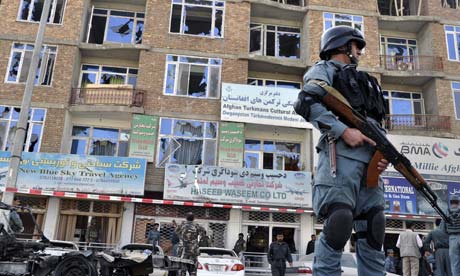Cycle of Violence Continues in Afghanistan
The cycle of violence continues in Afghanistan

NEW DELHI: Two days after Taliban fighters killed two security guards on the eastern outskirts of the Afghan capital city of Kabul, officials say that they killed four Taliban suicide bombers during an attack on a compound housing foreign workers in the capital city.
Like Monday’s attack, Wednesday’s attack on the large compound, known as the Green Village, targeted foreign workers.
Since the Green Village had been targeted several times in the past, the place was heavily guarded and the attackers failed to reach their intended target," Interior Ministry spokesman Sediq Sediqqi said. The compound was targeted in October 2013 when a suicide bomber killed two civilians and in 2012 when seven people were killed.
The Afghan Taliban claimed responsibility for the attack. The attack is reflective of the deteriorating security situation in Afghanistan -- with security forces being increasingly targeted. In fact, since Ashraf Ghani came to power as President, Taliban activity seems to have increased.
Last week, a convoy of vehicles belonging to American-led coalition forces was attacked twice by Taliban gunmen. Although the convoy suffered no casualties, an Afghan civilian died in the attack. A few days ago, on Monday last week, two separate bombings killed at least ten police officers, including a top commander. The bombings, in turn, followed an attack on the police headquarters in Kabul a day earlier that killed a senior police officer and injured six others. The explosion reportedly happened two hours after another explosion in Kabul, with news reports from the region quoting Defence Ministry Spokesman Mohammad Zahair Azimi saying that the earlier attack was on an Afghan army vehicle that resulted in no casualties.
Earlier, in October, six police officers and two civilians were killed in two separate attacks on the same day, a day after members of the Taliban ambushed a police convoy, leading to an hours-long gun battle in northern Afghanistan. Before that, in the same month, Taliban insurgents killed 22 security force members in Sar-e-Pol province north of Kabul, which in turn, followed a bomb in Kabul on the same day that killed one civilian.
A few days ago, although not claimed by the Taliban, a prominent female politician -- Shukria Barakzai -- narrowly escaped a suicide attack that killed three others.
Other recent attacks -- leading up to and during the Presidential elections -- include an attack that killed three soldiers belonging to the United States-led International Security Assistance Force (ISAF) in September, a suicide bombing that killed Karzai’s cousin Hashmat Khalil Karzai, the shooting of 15 civilians, two Finnish relief workers, an attack on the Kabul airport, and one of the deadliest attacks since 2001 wherein a sports utility vehicle detonated in a busy market in Paktika province, eastern Afghanistan, that killed 90 people.
This cycle of violence comes as a majority of foreign troops are set to withdraw from Afghanistan at the end of the year. As per the Bilateral Security Agreement (BSA) signed 9800 United States troops and an additional 2000 NATO forces can remain stationed in Afghanistan after December 2014, which is when all other troops will be withdrawn and which is the date that the international combat mission formally ends.



